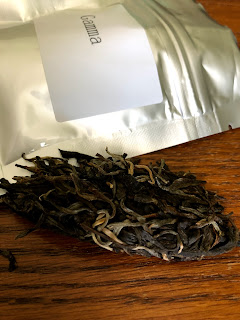Epsilon
The loose hairy small dry leaves smell of an almost metallic
pungent odour with a touch of creamy sweetness.
The first infusion has a very intensely creamy cotton candy
sweetness in the initial taste which swells in the mouth. The profile is very pure and clean and
sweet. The mouthfeel is fluffy and slightly
sticky. There is a slight taste of hay
or straw in the background and a mild returning coolness.
The second infusion has almost an orchid floral honey like
sweetness with the floral note dominating here.
The fragrant sweetness is heavy in the full cottony slight stickiness
of the mouth and throat. The hay note has
disappeared to these strong dominant sweet florals. They linger for some time in the throat. The lips become sticky and full.
The third infusion has a less intense floral sweetness but
it is still strong and dominant. It has
a rain-foresty taste initially as well which plays out through the
profile. The mouthfeel becomes fuller
and lightly grainy with that cotton feeling predominating.
The fourth has a creamy floral vanilla almost metallic
initial taste with the floral creamy candy like sweetness still dominating
here. There are hints of mild dry wood
and metallic taste in the base profile of this tea. The aftertaste pumps the sweetness up again,
it crests, and then recedes slowly like a wave.
The fifth infusion is more forest in initial taste then an orchid
sweetness builds. In the aftertaste it
is almost cotton candy like in taste and expands on the full and grippy
mouthfeel and throatfeel. The mid throat
is opened up by this sensation. The
profile feels very natural and harmonious.
The qi of this one is nicely relaxing and makes the head and shoulders
feel light.
The sixth infusion starts off with pungent forest notes
which keeps the pungency but turns sweet quickly. The sweet taste crests throughout the profile
and develops a cotton candy like feel to it.
This infusion is much the same as the fifth.
Seventh has a burst of pungent sweetness and florals. These tastes are dominant over rain forest
like tastes. The first signs of light
fruitiness appears and disappears in the start of the aftertaste.
The eighth has a strong pungent initial taste with sweetness
under the pungent. This spiciness seems
to be the dominating flavor in the last two infusions. The sweetness lasts longer than the pungent
in the aftertaste which carries on for quite some time. The mouthfeel is back to being more cottony
now. The qi continues to mildly relax.
Ninth is more watery now in its taste and carries barely
pungent creamy sweetness with a bland forest taste as the base taste now. The aftertaste continues to be the most
interesting of the profile as creamy floral sweetness is left along to
linger. The qi is not overly strong but
relaxing and slightly floating. The body
sensation is light and airy. The wet
leaves are small and slightly more stems.
The tenth infusion 10 seconds are added to the flash
steeping and it brings out more of the pungent sweetness and more full sweet
taste throughout the profile.
The eleventh 25 seconds are added to the flash steeping and
a slightly metallic pungent sweet note is fading but present. The twelfth 30 seconds are added and it
tastes and feels much the same but with less sweetness.
This tea is put into a few days long steeping.
I am a bit unsure about what area this tea could be but my
best guess is Yibang. I believe that the
sample in question is this 2017 Yunnan Sourcing Brand Autumn Yibang.
Zeta
Opening this sample reveals that this is a shu puerh! Quicker than the musty, mossy, shu puerh dry
leaf odour hits me, I am convinced this must be the very popular Chinese Zodiac
shu puerh that Yunnan Sourcing is quite famous for! This year it is the 2017 Yunnan SourcingRooster King.
My wife quite enjoys a good shu puerh so I decided to puerh
mug this shu with her instead of doing one of my conventional reviews. The mugs were a wedding gift made by a famous
local potter and are very dry feeling like the air in the prairies.
We enjoy the thick, viscous and warming energy of this multifaceted
shu on this cold Canadian mid-winter day.
The taste nicely evolves and is much more than many monotone tastes but
is rather cohesive and full in flavor for a shu. It has a nice oily mouthfeeling which feels especially
satisfying on these cold dry days. This
is a very good and satisfying shu puerh and I now understand why it is so popular
in Western puerh circles.
Well that’s all 6 teas blind tasted.
Thanks to Scott at Yunnan Sourcing for offering these teas
for the blind tasting and all the bloggers out there who participated. I look forward to reading may more posts of
this blind testing over the next few weeks by some of the other bloggers out
there.
Peace
Answers:
2017 Yunnan Sourcing "Qing Mei Shan" Old Arbor Raw Pu-erh Tea Cake <--- font="" psilon="">
2017 Yunnan Sourcing "Rooster King" Ripe Pu-erh Tea Cake <--- eta="" font="">


















